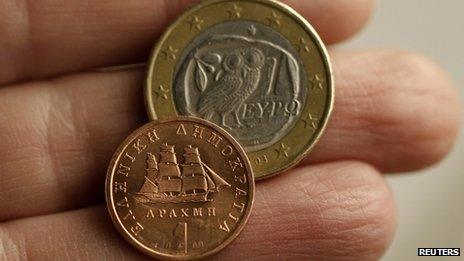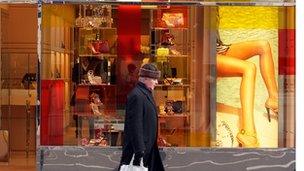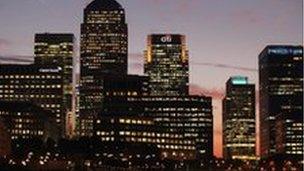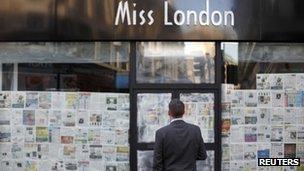Global investors pile into London property
- Published

Many Greeks fear their savings will be eroded if Greece leaves the euro and returns to using the drachma
On a crisp and cold Sunday morning, St Sophia's, the Greek Orthodox Cathedral near Hyde Park in London, is busy.
The Sunday service is well attended and the congregation seem to drift in and out while the priest says Mass. Well-heeled women and men in black suits mill around afterwards with children in their Sunday best.
But for younger members of the congregation, such as Panos Papadopoulos, 27, the thought of having children seems unreal at a time when his homeland is experiencing such economic turmoil.
"In Greece it's difficult to start a family; it's out of the question."
So instead, Mr Papadopoulos has come to London, to work in the gambling industry.
Bank deposits
These days, Mr Papadopoulos often fields calls from friends eager to follow in his footsteps.

Properties in New Bond Street are popular with the super-rich
They are all, he says, members of a lost generation, compelled to leave their homeland, panicked about the prospect of Greece leaving the eurozone and returning to the drachma.
Friends of Mr Papadopoulos, afraid of their life savings being wiped out by such a shift, have even started sending him their cash - "a thousand euros at a time for me to keep for them".
It seems many Greeks are taking a similar stance. Bank deposits have fallen 21% since January 2010, according to Greek central bank data.
London property
Small money may be squirreled away in friends' foreign bank accounts, but big money from large investors has been used to buy very visible assets.
The London property market has been a huge beneficiary of this global capital flight, as it is seen by many as a safe haven.
On the high end of this scale of capital investment is the commercial property market.
"Since 2008, London has been the most traded real estate market in the world," according to Damian Corbett, a director at the property advisory firm, Jones Lang LaSalle.
He specialises in the commercial sector and says that 60% of the investment in London is from foreign investors.
One such investment company is the Lebanon-based M1 Group.
Through its M1 Real Estate, it bought Victoria House in Bloomsbury last year for £175m and Credit Suisse's headquarters in Canary Wharf in 2009 for £155m.
'Integration is easy'
"The system in London is very investor-friendly with transparent legal structures," according to Moustapha El-Solh, the real estate arm's chief executive.

For the first time, more than half the offices in the City of London are now foreign-owned
"And it has fiscal benefits in terms of tax and capital gains which give it a certain advantage."
As such, Mr El-Solh thinks London has the edge over its European rivals.
International corporations use London as a base for Europe, Africa and the Middle East and their staff like London's cosmopolitan attitude, he says.
"The social structure is very open and integration is easy," he observes.
"The education system is competitive and there is a good curriculum."
London growth
London also responds quickly to global market pressures, according to Mr Corbett.
In late 2008, there was a 40% drop in values post the Lehman Brothers crash and as Sterling weakened, he recalls.
Bizarrely, perhaps, this huge markdown did little to dampen investor sentiment, he continues. In contrast to the fortunes of the US and other real estate markets, it led to a substantial increase in overseas interest.
As such, London stole the crown from New York in 2008 as the most traded real estate market in the world.
According to Mr Corbett, the number of transactions in London rose 25% in both 2009 and 2010 and is likely to increase by a further 10% this year.
The City of London, home to the finance community, has seen a similar story, according to a report entitled Who Owns The City? by property group Development Securities.

Commercial property in London is considered safe during a time of crisis in Europe
Their research shows 52% of offices are now owned by foreign investors, up from just 10% in 1980. This is the first time the balance has tipped in favour of outside capital in the City of London.
During the 2008-2011 period, some 42% of sales were from UK owners to foreign investors, with just 6% being traded the other way, the Development Securities data shows.
These foreign investors are discerning and are focusing on prime assets.
The report shows the average price paid for a building between 2008-2011 by such an investor was £91m, about three times the average £27m purchase price paid by a UK buyer.
Investors from which nations are the big winners and inevitable losers? Well, UK buyers are still the biggest group, holding 48% of all property here, followed by German investors which own 16%, US investors which own 10% and Middle Eastern investors which own 6%.
Japanese investment has fallen two percentage points from a high of 11% in 1995, while and European investment excluding Germany has fallen to 5% from a high of 8% in 1995.
Rise of super-rich
There has also been a growing trend towards the super-rich, often labelled high net worth individuals, buying property.
A prestigious address such as New Bond Street can be very attractive, Mr Corbett points out, even though yields on such investments is often as low as 2.5% - partly because it is deemed as safe.
The super-rich are also buying in the City. Officially they own some 6% of the office space there, but Development Securities think that could be an underestimate as it is difficult to trace ownership and there is a culture of secrecy.
Mr Corbett says he has noticed that some of this clientele are now buying to keep rather than investing for the usual three to five years.
"[They are] putting property in a trust and leaving it for their children," he says.
In London Mr Corbett is planning for a potential increase in the numbers of available properties coming onto the market in 2012.
That is because some investors borrowed before the crash on five-year deals that are about to expire and the markets are now more debt-averse, so some may have to sell.
- Published5 December 2011
- Published28 November 2011
- Published19 March 2011